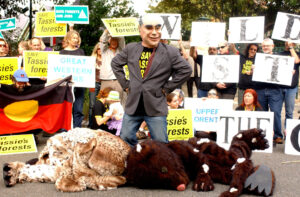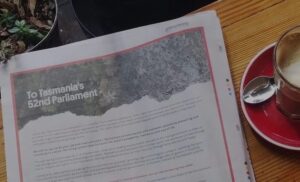Proposed laws that impose harsh fines and jail time for a broad range of peaceful protests are unnecessary and an assault on citizens’ fundamental democratic rights, writes Rachel Hay

The Tasmanian Government is continuing its draconian attack on our right to peacefully protest with new laws that impose harsh fines and jail time for a broad range of non-violent protest activity.
Protest is an important form of communication that influences decisions made by our democratic representatives. From decriminalising homosexuality and protecting the Franklin River to fighting for better working conditions and voluntary assisted dying, peaceful protests have shaped the lutruwita/Tasmania we enjoy today.
Yet the Tasmanian Government is now on its fourth attempt at creating anti-protest laws. This is despite opposition from an array of civil society groups, criticism from the UN about the right to freedom of peaceful assembly and the High Court of Australia ruling against the first version of the legislation. The High Court found the anti-protest law was invalid because it breached the freedom of political communication implied by the Australian Constitution. Given this history, the fate of the draft law, if passed, remains unclear.
What is clear is that the Tasmanian Government is nothing if not persistent in its attack on citizens’ democratic right to peaceful, non-violent protest.
In creating this new law, the Government claims it wants to protect workers from “extremist protests”. But where is the evidence that protestors are risking workers’ safety? This law creates a solution to a problem that doesn’t exist.
The Government states that they have “no intention to…put in place anything that will limit lawful protesting”. Yet the wording of the Bill makes it clear that it will restrict non-violent protest.
The Police Offences Amendment (Workplace Protection) Bill 2022 increases the penalty for public annoyance more than threefold, to $1,730, and makes it an offence to obstruct the passage of vehicles or pedestrians on a street.
In my submission to the public consultation on the Bill for the Australia Institute Tasmania, I found that it will affect a vast range of peaceful protest activities, in a variety of public spaces. It could extend to a person holding a placard on the pathway at Parliament Lawns, handing out flyers at Salamanca Market, or asking for a petition to be signed on the sidewalk.
Astonishingly, the legislation is so broad that even people experiencing homelessness could be prosecuted for sleeping rough.
The Bill also creates three types of aggravated trespass with disproportionate penalties. First, it makes it an offence to obstruct a business while trespassing, with a fine of up to $8,650 or 1 year imprisonment. Under this offence, peaceful, non-violent protestors will receive the same penalty as people who trespass while holding a gun, or perpetrators of aggravated assault.
Holding a placard is not the same as holding a gun. Yet, under these proposed new laws, they will be treated the same.
Far from protecting the rights of workers, these laws could actually restrict workers’ rights. If a worker is part of an industrial action at their workplace and is asked to leave but refuses, they could be charged under this offence.
Second, the draft law makes it an offence where a protestor directly or indirectly risks the serious injury of a person. This vague and broad language could see protestors facing fines of up to $21,625 or two and a half years imprisonment for a broad and innocuous range of activities. For such an action a protestor could face a higher penalty than if they drugged another person, assaulted a police officer, or set fire to a property.
Third, under this draft law, where it is a corporation obstructing a business, they will be liable for a fine of $103,800 – four times higher than the current highest penalty unit in the legislation. Again, workers could be affected, as unions could be found liable under this provision.
There are already laws which protect workers from interference. Where a person trespasses, creates a public annoyance or is a common nuisance, they are committing an offence. Police officers also have discretion to ask people to leave certain areas and can arrest them if they don’t.
So if the Tasmanian Government is not protecting workers with these draft laws, who are they protecting?
The Australia Institute Tasmania and a coalition of civil society groups are calling on the Rockliff Government to withdraw this undemocratic law. If not, we urge all Members of Parliament to reject it, and instead protect citizens’ democratic right to protest.
Rachel Hay is the Anne Kantor Research Fellow at the Australia Institute Tasmania, and authored the Australia Institute Tasmania’s submission to the public consultation on the proposed anti-protestor legislation.
Related research
Between the Lines Newsletter
The biggest stories and the best analysis from the team at the Australia Institute, delivered to your inbox every fortnight.
You might also like
Open Letter to the Tasmanian Government
The Australia Institute and 30 other organisations from around Tasmania have published an open letter with 10 asks for the environment from whomever forms Tasmania’s next government. When cross-benchers and major parties have struck successful power-sharing agreements elsewhere, they covered policy as well as procedure, making now the ideal time for progress.
Who’s going to stand up and make Nazis ashamed again?
A “March for Australia” rally sounds benign, but people who plan to attend the “March for Australia” rallies around the country on Sunday will almost certainly be marching alongside white supremacists and neo-Nazis.



